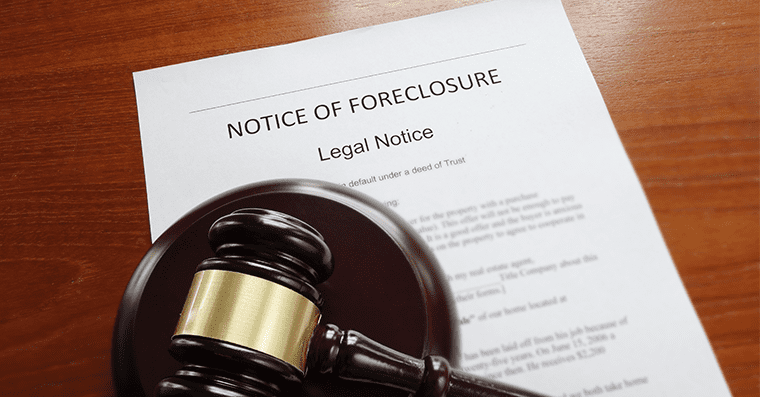Learn More About Foreclosures

Although you've probably heard of a foreclosure and maybe even known people who went through one, that doesn't necessarily mean you know all the details behind one. What does it mean for a home to go through a foreclosure?
The Lender Taking Control of the Property
In its simplest terms, a foreclosure describes when a lender takes control of a property again. You might hear it described as "the bank taking back a home." Except, the bank doesn't really want the home; it wants the money it is owed for the home.
This is how a foreclosure works: the bank lent a person money to buy a home, and the home is the collateral for the loan. If the person defaults on the loan, which describes when the person stops making payments, the bank can then take back the home to sell to get its money back. "Foreclosure" describes the process by which the bank repossesses and resells the home.
A Lengthy Pre-Foreclosure Period
Before actually foreclosing on a mortgage, a lender will go through a pre-foreclosure period that can often take over a year; the foreclosure doesn't start the moment the mortgage payments fall behind. In fact, because the foreclosure process can take such an extremely long time, some lenders will actually prefer to restructure payments and even interest rates to accommodate a buyer who wants to keep the home, but has perhaps fallen on hard times and can't pay as much every month anymore.
Different banks utilize different pre-foreclosure periods, and it's important for you to recognize that. Whether you're worried about foreclosing, you're trying to research someone else's foreclosure, or you just want to learn more about it, it's a good idea to learn the specifics of a pre-foreclosure period.
Not Ideal for the Lender or Buyer
A foreclosure is bad for all parties involved, and that's one of the reasons some lenders will actually try to work out a deal with the buyer rather than immediately foreclose. The lender has to go through the arduous and often fee-heavy process of taking back the home from the lender, sometimes by force. And the buyer, of course, loses the home and receives a heavy credit score mark.
Try not to judge someone who has had to foreclose too harshly. Although it can definitely be evidence of poor money management, it might just be a symptom of the times --- significant medical problems, losing a job, or any other issues can contribute to this problem.
Browse Properties by State
How Does a Foreclosure Impact Someone's Records?
A foreclosure has a substantial impact on an individual's records and history. But how does that really manifest?
Credit Score
As a foreclosure has to do with a significant inability to manage finances, it's incredibly impactful on your credit score. There aren't any exact numbers on how a foreclosure impacts a credit score, but the higher your score is before the foreclosure, the more it will actually impact your credit score. If you have an extremely high credit score before foreclosing, you might end up with almost a 200-point loss.
Just like a bankruptcy, a foreclosure will generally stay on your FICO score for around seven years. Additional missed payments, which are of course part of a foreclosure, might have an even stronger impact. Although your FICO score will start to disregard the foreclosure as time goes on, seven years is a very long time to have that black spot on your records.
Criminal Records
You might not think of a foreclosure as being a criminal issue. But in some cases, it may be. It's a good idea to check the state of the foreclosure to see how much overlap you can find between criminal records and the foreclosure proceedings, so you have a good idea of whether you might be held liable for certain foreclosure-related issues.
Remember that criminal records don't always have anything to do with violence or other damaging crimes. In some states, writing a bad check can become a felony depending on the number of offenses and the amount of the checks. If it turns up on a criminal records check, don't immediately start to worry. Research the circumstances, first.
Future Home Purchases
Obviously, a foreclosure shows that someone attempted to purchase a house, but was unable to go through the process in its entirety. That means future lenders will be extremely reluctant to allow that person to take out another loan to try and buy another house.
The simple credit impact of a home foreclosure can be enough for a lender to refuse a home loan. However, when a bank runs an individual's credit to determine eligibility, the foreclosure will also appear, and that can be a significant reason that a bank will refuse a home loan.
Can I Check to See If Someone Has a Foreclosure?

If you're curious about a person's history with managing finances, or you just want to know more about them, you can attempt to see if someone close to you has a foreclosure in their past.
Foreclosure Public Records
Because it's a legal proceeding, a foreclosure needs to be filed at the local courthouse. Legally, the bank is taking its property back, and filing to state that the buyer has broken one side of the contract. That means you should be able to find the foreclosure in public records, something you can do through PeopleFinders.
PeopleFinders offers plenty of public records across the United States. Across those records you'll find a variety of information; it's true that the information does contain specific criminal records and other shady behavior, which is useful information in some circumstances. But it also includes civil courts, such as when an individual files for foreclosure.
Someone's Bankruptcy Records
Bankruptcy records can offer good insight into whether someone has had a foreclosure in the past. Even if a person didn't have a foreclosure, bankruptcy records will still show if a person has had significant issues with money. Though you should be able to find foreclosure records in a public records search, finding bankruptcy records may give you extra insight into a person's current and past money situation, and how the individual managed all of it.
As with the foreclosure records, general public records may also help you here. It might amaze you how much information you can find on public records. That includes criminal information as well as civil information --- whether you're interested in becoming friends with someone or entering into a business partnership together, public records can help.
Check a Person in General
You deserve to have whatever safety information you need about someone. Depending on who you are and who the other person is, that safety information might include foreclosure records, bankruptcy records, other public records, criminal records or any other number of important documents that give a little more insight into what a person is like.
With PeopleFinders, you don't have to worry about that kind of safety information remaining hidden. You can look through over a petabyte's worth of records on millions of American adults in the PeopleFinders database, and hopefully get everything you need today.
Frequently Asked Questions
How can peoplefinders.com help with foreclosure information?
PeopleFinders can help you retrieve foreclosure information as it relates to a specific property (address search) or person (people search).
Can I find foreclosure information for free on peoplefinders.com?
Unfortunately, no. The effort it takes to aggregate foreclosure information necessitates payment to access it.
How can I do research on foreclosures online?
Next to PeopleFinders, you can attempt to locate foreclosure information on a real estate listings site.
How do public records help with understanding foreclosures?
Foreclosures are considered part of the public record. Therefore, if a person or property has had a foreclosure in their past, you should be able to find out about it relatively easily.
Where else can I go to get information about foreclosures?
If you aren't finding what you need online, you can always attempt to locate foreclosure information at the county clerk's office of record.



